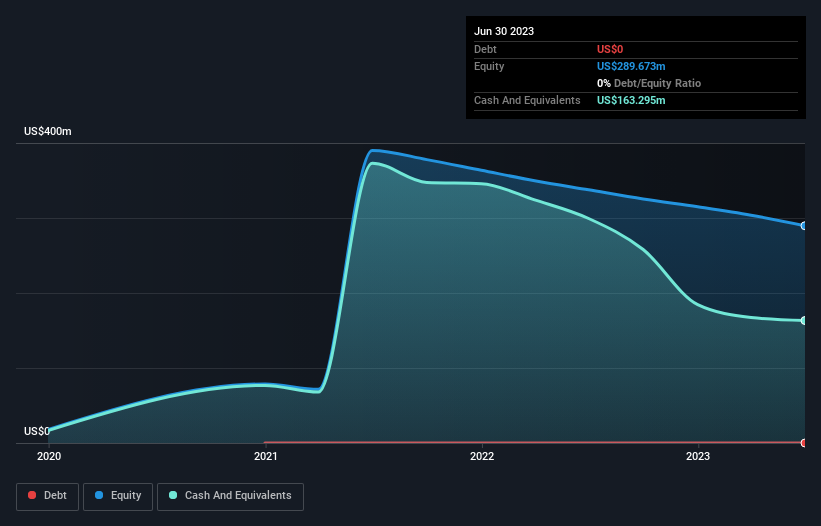We're Hopeful That Nautilus Biotechnology (NASDAQ:NAUT) Will Use Its Cash Wisely
We can readily understand why investors are attracted to unprofitable companies. For example, although software-as-a-service business Salesforce.com lost money for years while it grew recurring revenue, if you held shares since 2005, you'd have done very well indeed. But while history lauds those rare successes, those that fail are often forgotten; who remembers Pets.com?
Given this risk, we thought we'd take a look at whether Nautilus Biotechnology (NASDAQ:NAUT) shareholders should be worried about its cash burn. In this article, we define cash burn as its annual (negative) free cash flow, which is the amount of money a company spends each year to fund its growth. The first step is to compare its cash burn with its cash reserves, to give us its 'cash runway'.
View our latest analysis for Nautilus Biotechnology
When Might Nautilus Biotechnology Run Out Of Money?
A cash runway is defined as the length of time it would take a company to run out of money if it kept spending at its current rate of cash burn. When Nautilus Biotechnology last reported its balance sheet in June 2023, it had zero debt and cash worth US$163m. Importantly, its cash burn was US$48m over the trailing twelve months. So it had a cash runway of about 3.4 years from June 2023. A runway of this length affords the company the time and space it needs to develop the business. The image below shows how its cash balance has been changing over the last few years.
How Is Nautilus Biotechnology's Cash Burn Changing Over Time?
Because Nautilus Biotechnology isn't currently generating revenue, we consider it an early-stage business. So while we can't look to sales to understand growth, we can look at how the cash burn is changing to understand how expenditure is trending over time. As it happens, the company's cash burn reduced by 8.7% over the last year, which suggests that management are maintaining a fairly steady rate of business development, albeit with a slight decrease in spending. While the past is always worth studying, it is the future that matters most of all. So you might want to take a peek at how much the company is expected to grow in the next few years.
Can Nautilus Biotechnology Raise More Cash Easily?
While Nautilus Biotechnology is showing a solid reduction in its cash burn, it's still worth considering how easily it could raise more cash, even just to fuel faster growth. Companies can raise capital through either debt or equity. Commonly, a business will sell new shares in itself to raise cash and drive growth. We can compare a company's cash burn to its market capitalisation to get a sense for how many new shares a company would have to issue to fund one year's operations.
Nautilus Biotechnology's cash burn of US$48m is about 17% of its US$292m market capitalisation. Given that situation, it's fair to say the company wouldn't have much trouble raising more cash for growth, but shareholders would be somewhat diluted.
How Risky Is Nautilus Biotechnology's Cash Burn Situation?
It may already be apparent to you that we're relatively comfortable with the way Nautilus Biotechnology is burning through its cash. In particular, we think its cash runway stands out as evidence that the company is well on top of its spending. On this analysis its cash burn reduction was its weakest feature, but we are not concerned about it. Considering all the factors discussed in this article, we're not overly concerned about the company's cash burn, although we do think shareholders should keep an eye on how it develops. Taking a deeper dive, we've spotted 3 warning signs for Nautilus Biotechnology you should be aware of, and 2 of them are a bit unpleasant.
Of course Nautilus Biotechnology may not be the best stock to buy. So you may wish to see this free collection of companies boasting high return on equity, or this list of stocks that insiders are buying.
Have feedback on this article? Concerned about the content? Get in touch with us directly. Alternatively, email editorial-team (at) simplywallst.com.
This article by Simply Wall St is general in nature. We provide commentary based on historical data and analyst forecasts only using an unbiased methodology and our articles are not intended to be financial advice. It does not constitute a recommendation to buy or sell any stock, and does not take account of your objectives, or your financial situation. We aim to bring you long-term focused analysis driven by fundamental data. Note that our analysis may not factor in the latest price-sensitive company announcements or qualitative material. Simply Wall St has no position in any stocks mentioned.

